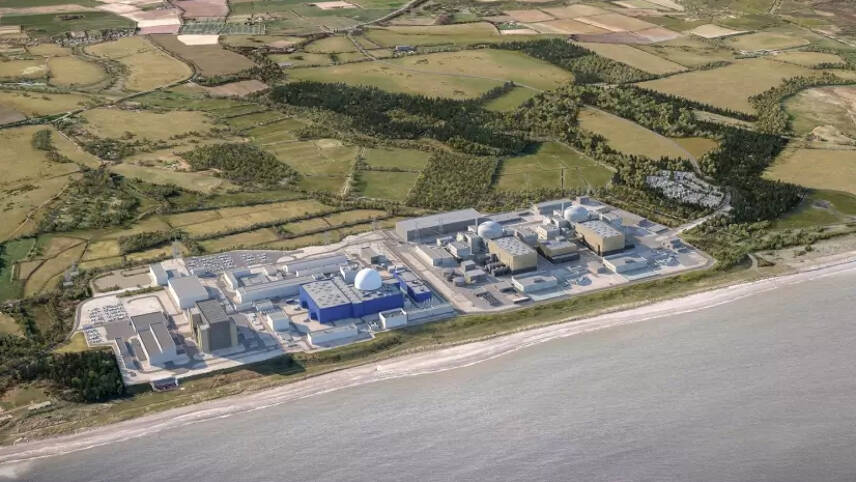Register for free and continue reading
Join our growing army of changemakers and get unlimited access to our premium content

Pictured: An artist's impression of Sizewell C. Image: EDF
The Planning Inspectorate published a letter on Kwarteng’s behalf this afternoon (20 July) confirming the decision, which was originally due in May but was delayed to early July allow Ministers more time to review the project’s impacts. Subsequent, shorter delays arose around Boris Johnson’s resignation.
EDF, Sizewell C’s primary funder, first put forward plans for the two-reactor plant in Suffolk in 2012. It then submitted a development consent order and planning permission documents in 2020, but received a refusal from Suffolk County Council and the Planning Inspectorate. Refusal was given on the grounds that insufficient information was provided about the project’s impacts on local communities and nature. Particular concerns included procuring water and potential impacts on the local nature reserve.
EDF is now believed to have provided more information to allay these concerns and Kwarteng is pushing ahead with the projects on the grounds of Sizewell C’s potential contribution to the UK’s energy and climate target.
BEIS estimates that 3.2GW Sizewell C would generate enough electricity to meet 7% of the UK’s annual demands once operational. Kwarteng’s decision letter states that there is a “very substantial and urgent need” for the plant in the face of the energy trilemma – cost, carbon impact and energy security.
The Government’s Energy Security Strategy, published in April, envisions a scenario in which nuclear electricity meets 25% of the UK’s demands by 2050. It states that the Government should support the delivery of up to eight large nuclear plants this decade, as well as small modular reactors.
Unsurprisingly, today’s decision was welcomed by the Nuclear Industry Association trade body, which called it a “huge step forward for Britain’s energy security and net-zero ambitions” and noted the decision’s potential to attract more investment in the sector.
Union GMB welcomed the decision but urged the Government to provide an update, as soon as possible, on its investment plans. Without more Government support, GMB’s national officer Charlotte Childs said, the “whole project could be put in jeopardy”. The Government confirmed a £100m option fee contribution to the £20bn project in January.
As expected, several community campaign groups and environmental organisations are considering challenging the decision, which they have six weeks to do. One such group is the RSPB, which operates the Minsmere nature reserve near the Sizewell C site.
RSPB’s chief executive Beccy Speight said: “We are dismayed that the decision by this interim Government goes against the advice of the Examiners and their own experts in this matter.
“The construction of the proposed development will be damaging and it has been granted with insufficient consideration for the effects on nature as described by the Government’s own experts. This is a ludicrous decision for an interim Government to make. We will be fully reviewing the reasons for the decision and will consider our options. We thank everyone who has supported and worked with us throughout the planning process and we will continue to do all we can for Minsmere and Suffolk’s important wildlife.”
State of play with project finance
Earlier this year, the Government passed a new Nuclear Energy (Financing) Bill, which will change the funding model for new nuclear projects from the current Contracts for Difference (CfD) approach to a Regulated Asset Bade (RAB) funding model. Kwarteng is a staunch supporter of this change, which will reduce the risk to investors by providing them with regular returns before the plants they support begin generating power.
EDF currently has a 20% stake in Sizewell C and the Government has announced plans to take a 20% stake. Chinese firm CGN was previously involved in the project, but BEIS and EDF are understood to be aiming to edge it out. As for the remaining 60%, Centrica is reportedly in the running to invest.
The Government has committed to reach a final investment decision on at least one large nuclear power plant this decade – Sizewell C being the most likely candidate.
The announcement from the UK Government came shortly after the French Government, which already controls an 84% stake in EDF, confirmed plans for full nationalisation. You can read more about that process in edie’s content partner Euractiv.
BEIS claims that the average UK home will pay £1 per month to aid Sizewell C construction costs. This is believed to be a conservative estimate. Concerns remain about whether the change will, ultimately, increase the costs to the general public – and whether the Government is making adequate interventions to shield low-income households from these costs. The Government, the Guardian reports, has rejected a proposal for electricity suppliers to be prevented from taking money from consumers receiving universal credit to fund their RAB payment obligations.


How good would it have been if HMG had, years ago taken control over our supply of electricity; the nations lifeblood.
We were the first into nuclear generation of electricity (Calder Hall, opened in the mid fifties by HM the Queen).
Ah me!
Richard Phillips